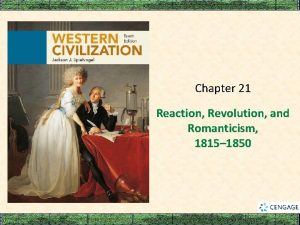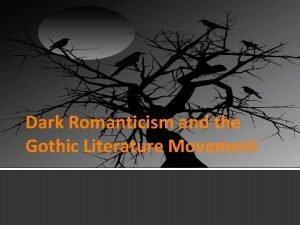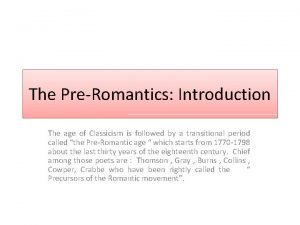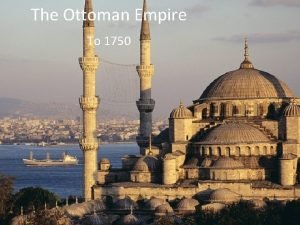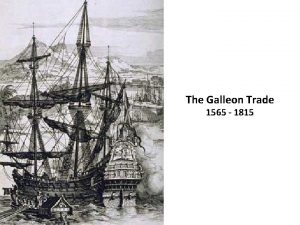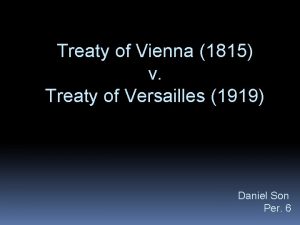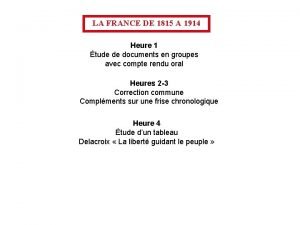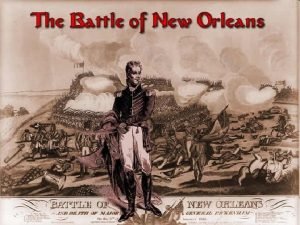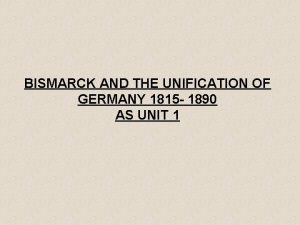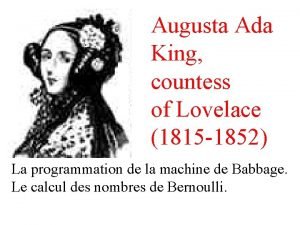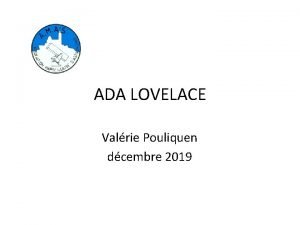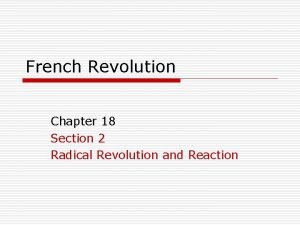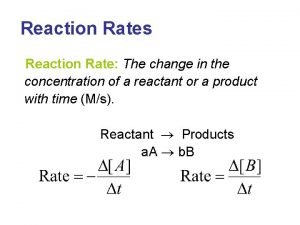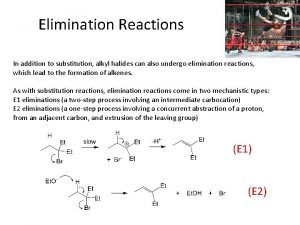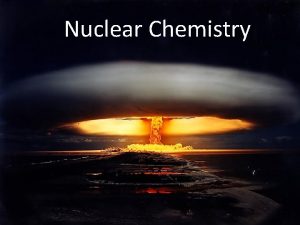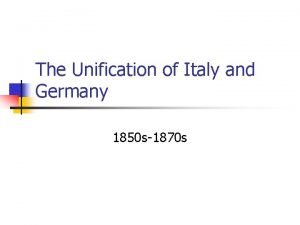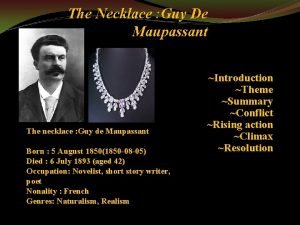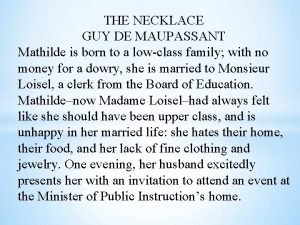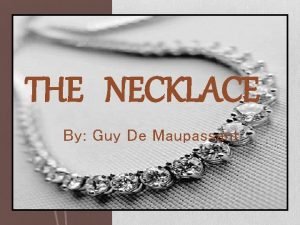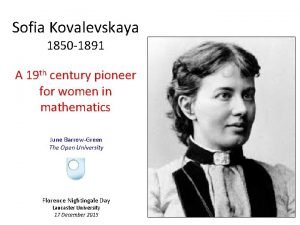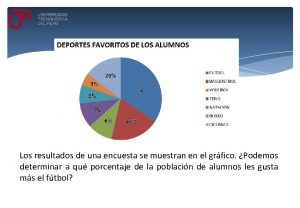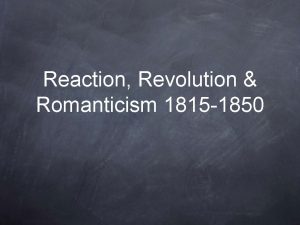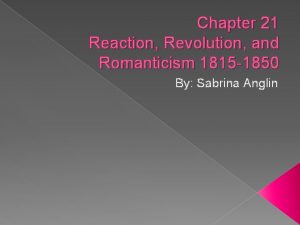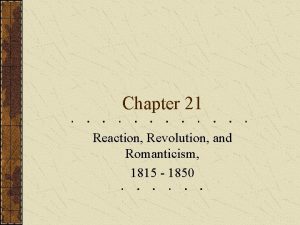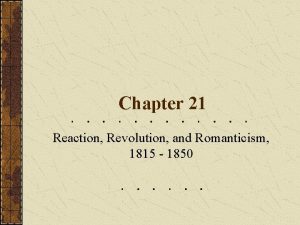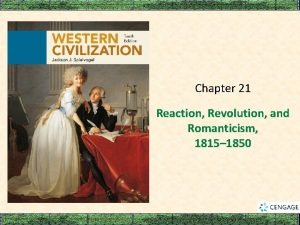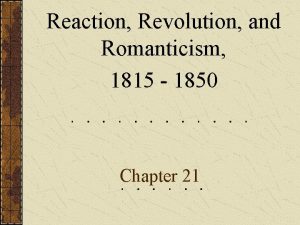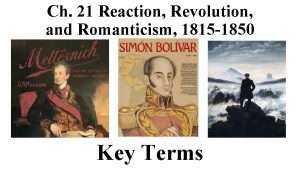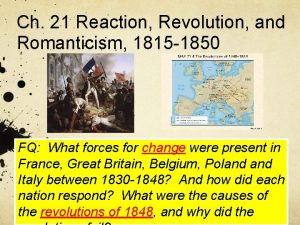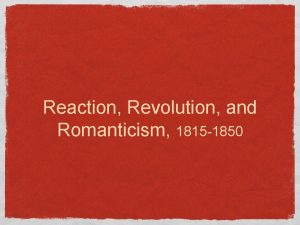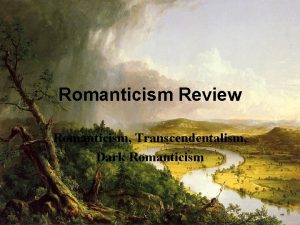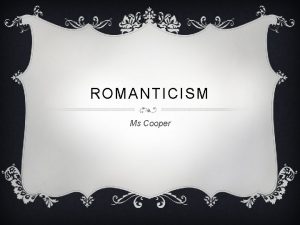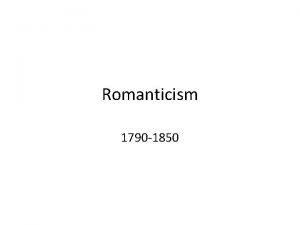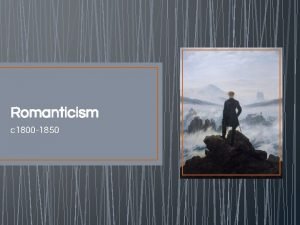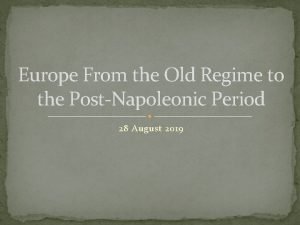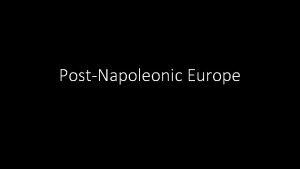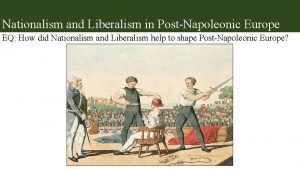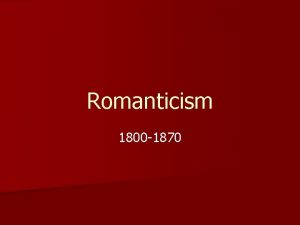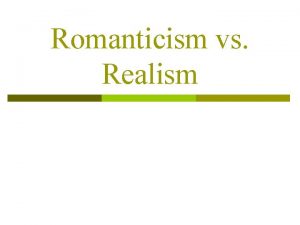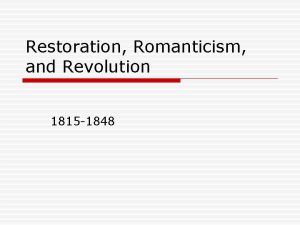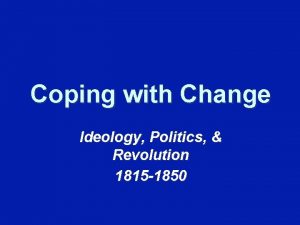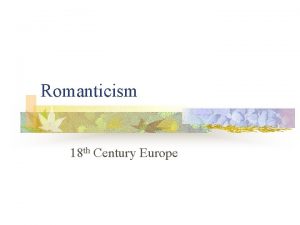PostNapoleonic Europe 1815 1850 Reaction Revolution Romanticism Chapter







![Latin America’s Revolutionary Wave 1820 s… • Haiti [during NB] • Slave revolt • Latin America’s Revolutionary Wave 1820 s… • Haiti [during NB] • Slave revolt •](https://slidetodoc.com/presentation_image_h2/a4f35fc267107c09c9073df814ff80d4/image-8.jpg)
























- Slides: 32

Post-Napoleonic Europe 1815 -1850: Reaction, Revolution & Romanticism Chapter 21: Western Civilization, 9 th Ed. by J. Spielvogel +

Post – NB European Borders… 1815 • Given these borders, what do you anticipate will occur next?

What did the Congress of Vienna desire for Europe? • Restore ORDER & Security • French Revolution was bloody, messy, OOC • Restore BALANCE OF POWER • PEACE via • Cooperation, Consultation & Consent • Restore LEGITIMATE rulers • Return of Monarchy & Aristocracy… traditional society WHY?

What did the Congress of Vienna help create? • Quadruple Alliance = GB + A + Pr + R… why? • Re-drew borders… why? • Concert of Europe… series of “congress meetings” • Promote common interests of Quadruple Alliance • Treaty of Aix-la-Chapelle (1818) = France restored • Protocol of Troppau (1820) = Principle of Intervention • Troops into Spain, Italian peninsula • Kept communication open, maintained STATUS QUO

What were the components of Conservatism? • Legitimate monarchs, NO Democracy or Constitutions • Landed Aristocracies [Old Regime] • Protection for property & privilege • Established State Supported Churches • Anti-Enlightenment or “new” religion • Leading Conservatives • K. von Metternich / Edmund Burke / Fr. Hegel

Plus… Authoritarian Conservatism • Joseph de Maistre (F) • Hereditary Absolute Monarchy brings ORDER • Divine Right & Obedience • Counter-revolution as needed to preserve tradition • Violence for the “right” reason is OK

However, other ideas also emerged in the 1800 s… • Nationalism • The desire to have your own nation and not be ruled by others • Subjugated peoples wanted their own nations, no more empires • Freedom • Autonomy • Liberalism • The desire to reform the existing political, economic & social structures in order to create greater equity
![Latin Americas Revolutionary Wave 1820 s Haiti during NB Slave revolt Latin America’s Revolutionary Wave 1820 s… • Haiti [during NB] • Slave revolt •](https://slidetodoc.com/presentation_image_h2/a4f35fc267107c09c9073df814ff80d4/image-8.jpg)
Latin America’s Revolutionary Wave 1820 s… • Haiti [during NB] • Slave revolt • South America • Creole revolts • Venezuela • New Granada • Rio de la Plata & Chile • New Spain(Mexico) • Creole/Native revolt • Brazil = non-violent What “opened the door” for these revolts to take place?

Early 1800 s Latin American Revolutions Creole led in South America • Enlightenment Educated + Limited Opportunity = • Sought: Free Trade, Equality b 4 Law, Free Press • Simon Bolivar (north) + Jose de San Martin (south) • Mexico + Central American independence in 1820 s leads to… Monroe Doctrine • Monroe Doctrine = No European intervention or Counter-Revolution in West… US is “protector” • Result? US & GB dominate Latin America 1800 s

The Revolutionary Wave, continues… • The Balkans • “Eastern Question” = Ottomans? ? • Conflict of Interest • R & A >> Land • F & GB >> Biz • Christianity v. Islam • Greece 1821 • No initial direct intervention • 1827 Treaty of London #1… naval support, demand independence • Treaty of Adrianople 1829 • R intervention >> allows GB / F / R decision making power • 1830 Treaty of London #2 = Greek independence >> Otto I Black Sea

The Revolutionary Wave continues… Serbia • National Identity • Slavic & Orthodox • Guerilla War by Kara George • Partial Autonomy • Negotiated by Milos Obrenovitch • Independence granted 1830 by Ottomans • Territory, border & [ethnic / religious] minority issues = tension • Links to Russia • Slavic Culture, Religion, Trade & Alliance

1800 s Conservatism in GB: Tories = “Old” Aristocracy Whigs = “New” Aristocracy + Industrial based urban Middle Class… Issues: Suffrage? Tariffs? Censorship? Monarch Veto Power Head of State Parliament Laws + Policy Tory – Whig – Labor (later) House of Lords House of Commons Inherited / Appointed Nobles + Clergy Veto Power Elected Middle Class

Revolt? Reforming Great Britain… step by step • Act of Union 1798 • Protestant Irish reps to House of Commons • Catholic Emancipation Act 1828 • RCs could be members of Parliament • Keeps peace in Ireland • Great Reform Bill 1832 • To solve “rotten borough” problem • ↑ electorate by re-drawing voting districts & reducing (↓) property qualifications

Revolution in France… again (1830) • Louis XVIII (Bourbon CM) dies 1824 • Charles X: Ultra-royalist + Divine Right • $ to nobles + primogeniture + power grab! • Four Ordinances: ↓ rights, ↓ power, ↓ gov’t • Dissolved Chamber of Deputies • July Revolt 1830: “Les Miserables” • Worker Revolt – Barricades in Parisian streets! • Charles X abdicates • Louis Philippe the “King of the French” • CM, Tricolor, ↑rights, shared power, but NO social Δ

What actions did conservatives take to preserve the status quo? • Austria • Dominates German Confederation & Italy • Prussia • No promised reforms • Diets ruled by Junkers • German States • Limited self-government • Carlsbad Decrees end Burschenschaften • Final Act limits free speech in government • Great Britain • Corn Laws = tariff • Combination Acts = no unions • Coercion Acts = no habeas corpus or “seditious” meetings • Peterloo Massacre • Gov’ t crushes protests with force • Six Acts = ↑gov’t power ↓ rights for dissidents • France • Catholic based education • Dissolving legislature

1820 s Russia: Story of Failed Reforms • Alexander I: Reactionary, Rejects Change • Suppression leads to secret reform societies • So. Union = Military officers (democracy) & N. Union = educated nobles (Con. Monarchy) • Political Crisis: No Heir = Constantine or Nicholas? • Constantine abdicates… privately = confusion • Decembrist Revolt 1825 = Failed Coup d’Etat by portion of military officers… leads to… • Nicholas I: Autocracy! Crackdown! • Censorship + Secret Police + Russification • “Orthodoxy, Autocracy and Nationalism” • Poland revolts crushed > Organic Statute 1832

Ideologies of Change: Liberalism Who were 19 th c. “Liberals? ” • Educated • Economically stable • Professional or Commercial oriented • Academics • Excluded or limited by previous regime • Believed in talent, merit & achievement

What did 19 th c. Political Liberal seek? • Freedom of the Individual • Legal Equality • Religious Toleration • Constitutional gov’t • Freedom of Expression • Consent of the governed • Equitable economic opportunity

Economic Liberalism aka Classical Economics • Adam Smith: The Wealth of Nations • Laissez-faire, Free markets, “Invisible Hand” • Individual Profit Motive, Supply / Demand • Thomas Malthus: Principles of Population • Population growth v. Food Supply debate • David Ricardo: Principles of Political Economy • “Iron Law of Wages” ↑ pop leads to ↓wages • Limited gov’t, economy is self-regulating

Ideologies of Change: Nationalism is… • The desire to have your own nation and not be ruled by others • Subjugated peoples wanted their own nations, no more empires • Freedom • Autonomy What is a “nation”? • A composition of people who share common • Language • Culture • Customs • History • Roots to a location • Nationalists opposed the principles of the Congress of Vienna, they desired Popular Sovereignty & Self-determination

Ideologies of Change: Socialism • Focuses on SOCIAL EQUALITY • Cooperation, not competition is best • Reaction to conditions spurred by Industrial Revolution • Charles Fourier (F): Community = “Phalanstery” or “Phalanx” • Rotation of work for mutual benefit of all • Robert Owen (GB): Environment = Provide best to get best • New Lanark , but in USA … why? • Louis Blanc (F): Gov’t funded, but workers operate + Worker Suffrage • Henri Saint-Simon (F): Management by experts, Gender =, Cooperation • Flora Tristan (F): Complete Social & Economic Gender Equality, Feminist

Ideologies of Change: Radicalism… • Anarchism… • Auguste Blanqui • Rejection of capitalism & government • Revolution! • Pierre-Joseph Proudhon • Anti-banking >> Credit for all • Mutualism. . . Community over the Individual • Community co-ops • Marxism >> Communism • Karl Marx & Friedrich Engels (G) • Communist Manifesto • Class struggle… • Proletariat vs. Bourgeoisie • Workers Should Control of Means of Production… • Phases • Revolution of Proletariat >> • Dictatorship of Proletariat >> • Communist Society • No government, no social classes, no “establishment”

1848: A Revolutionary Year… Outcomes?

1848! Revolutions… again, but… • France: ↓Economy + ↑Unemployment + ↑Scandal + Bad Gov’t = REVOLT! • Barricades + Riots = Louis-Philippe Abdication >> Provisional Gov’t • Result? Socialist influence, but a Moderate v. Radical Split • German States: pressure to change & unity… but fail in the end • Frankfurt Assembly: Grossdeutsch v Kleindeutsch debate • Result? Prussian king rejects offer to rule a “unified” Germany • Austria: Multi-ethnic revolts… Viennese, Hungarians & Czech all fail • Result? Russian intervention maintains Austrian Autocracy • Italian States: Risorgimento Movement led by G. Mazzini & Young Italy • Seeks unified Italy, • Result? Fails after Austrian, Papal & French intervention • Why Failure? Liberal / Nationalist division, failure to include working class

The Ordered Society Emerges Mid-1800 s: Why & How? • Revolutionary actions lead “Haves” to desire for protection from ↑crime! • Protection of Property & Security of People desired • Disciplined & Orderly society desired • Professional Police Force is born to “serve & protect” • French Sarjents , British Constables / Bobbies, – German Schutzmannschaft • Why does crime occur? Poverty? Character flaws? Secularism? Oppression? • Prison: Punishment or Rehabilitation? • ↑Crime > ↑Arrests > ↑Incarceration, Humiliation, Beatings, Chain Gangs • Capital Punishment or “Transportation” to Australia (GB) or Devils Island (F) • Reform? Solitary Confinement, Chapel, Work Groups… Effective? • Synthesis: How does this connect to today?

Romanticism: Culture in the mid-1800 s • Reaction against Enlightenment thought • Reason is not enough, use all of human capacity • Emotion, intuition, imagination, & feeling are equally important • Individualism emphasized anew, uniqueness of each human • Sacrificial Heroism emphasized Salisbury Cathedral by John Constable (GB)

Romanticism in Architecture • Neo-Gothic Revival • Pseudo-Castles • Medieval style • Pointed Arches • Towers

Romanticism in Literature & Poetry • History Based: • Thomas Carlyle: Heroism • Grimm Brothers & Hans Christian Andersen: Fairy / Folk Tales • Sir Walter Scott: Ivanhoe • Gothic Novel [Imagination] • Edgar Allen Poe: Gripping Short Story • Mary Shelley: Frankenstein [where science goes wrong? ] • Poetry of Love, Beauty, Nature, Pantheism [the Ode] • Wordsworth: Depth of emotion • Lord Byron & Percy Shelley: Dramatic, intense

Romanticism in Art • Rejection of Classicism & its Rules • Expression of the Artist Inner Self • David Caspar Friedrich (G): Landscape • JMW Turner (GB): Mood via Light & Color • Eugene Delacroix (F): Intense Light & Color

Romanticism in Music: Emotion & Mood Beethoven: Symphony • 3 rd = Eroica • The famous 9 th Berloiz: Program Music [sound tied to action] • Symphonie Fantastique

Romanticism in Christian Faith • Revival & Awakening: Tying Emotion to Faith – Your Whole Self! • Roman Catholic: Chateaubriand’s Genius of Christianity • Catholicism = Harmony of ALL things • Protestant Methodism: John Wesley (GB & USA) & Pietism (G) = Emotion w/ God • Heaven or Hell? God’s Mercy on the Undeserved Sinner is Great! • Crying, Joy, Raised Hands in Thanks & Worship, Your Whole Self!

Romanticism: Do you get it? Life is exciting, full of energy & passion!!!
 Chapter 21 reaction revolution and romanticism
Chapter 21 reaction revolution and romanticism Gothic romanticism art
Gothic romanticism art Pre romantic poem
Pre romantic poem The romanticism (1795 — 1835) what is romanticism
The romanticism (1795 — 1835) what is romanticism Ottoman empire in 1750
Ottoman empire in 1750 Galleon trade extended contact with
Galleon trade extended contact with Congresul de la viena ppt
Congresul de la viena ppt Treaty of versailles 1815
Treaty of versailles 1815 Egzaminatorius
Egzaminatorius Frise chronologique 1815 à 1870
Frise chronologique 1815 à 1870 Frise chronologique 1815 à 1870
Frise chronologique 1815 à 1870 Squirrel gun 1814
Squirrel gun 1814 1815
1815 Liberalism and nationalism in germany 1815-71
Liberalism and nationalism in germany 1815-71 Augusta ada king, countess of lovelace
Augusta ada king, countess of lovelace Lovelace 1815
Lovelace 1815 Sdružení pro vydávání a šíření českých knih
Sdružení pro vydávání a šíření českých knih Russian revolution vs french revolution
Russian revolution vs french revolution How could the french revolution been avoided
How could the french revolution been avoided Third agricultural revolution definition
Third agricultural revolution definition Radical revolution and reaction 18-2
Radical revolution and reaction 18-2 Unit of rate of reaction for first order reaction
Unit of rate of reaction for first order reaction Addition reaction and substitution reaction
Addition reaction and substitution reaction Leukoerythroblastic reaction vs leukemoid reaction
Leukoerythroblastic reaction vs leukemoid reaction Neutron emission
Neutron emission Where was prussia in 1850
Where was prussia in 1850 The necklace by guy de maupassant rising action
The necklace by guy de maupassant rising action Mathilde guy de maupassant
Mathilde guy de maupassant Complication of the necklace
Complication of the necklace Sofya kovalevskaya (1850 – 1891)
Sofya kovalevskaya (1850 – 1891) Nmercado livre
Nmercado livre Neoclassical 1750 to 1850
Neoclassical 1750 to 1850 Se muestran resultados
Se muestran resultados
